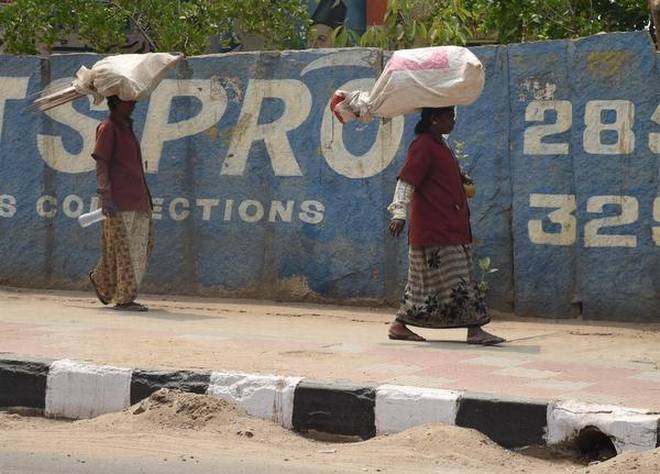 Twenty-four-year old Shanti looked at the calculator perplexed. According to the trade unionist standing before her, who had just computed her wage break-up, she was supposed to be earning Rs. 17,440 a month as a contract pourakarmika under the city corporation, the Bruhat Bengaluru Mahanagara Palike (BBMP). “Rs. 17,000, not Rs. 1,700?” she asks to confirm.
Twenty-four-year old Shanti looked at the calculator perplexed. According to the trade unionist standing before her, who had just computed her wage break-up, she was supposed to be earning Rs. 17,440 a month as a contract pourakarmika under the city corporation, the Bruhat Bengaluru Mahanagara Palike (BBMP). “Rs. 17,000, not Rs. 1,700?” she asks to confirm.
According to Shanti, she and nearly 50 other women from a settlement in Mahadevapura zone get Rs. 180 a day from the contractor. However, the contractor pays them only a week’s wages (Rs. 1,260) and keeps the remaining three weeks’ worth of wages for himself. “When we ask, he says he will pay us later,” she says.
The irony is that the contractor has no legal role in the payment of wages. Under the existing system, monthly wages should go directly to a bank account in the name of the worker.
The contractor submits a bill to the BBMP with the number of workdays put in by the pourakarmikas on his roll, based on which the BBMP remits the wages to the workers’ bank accounts. However, in several wards in Mahadevapura zone, contractors have confiscated the passbooks and ATM cards of pourakarmikas working under them. Many of the pourakarmikas, who come from other parts of Karnataka or from neighbouring States, do not even know they are being cheated of their hard-earned money.
Those who dare to speak up are either threatened with assault or thrown out of their homes.
“When we ask for our passbooks, they tell us to pack up our bags and go,” says Muniyappa*, a pourakarmika from Kurnool, Andhra Pradesh, who has been working for the past 10 years but does not know his account number. The threat of eviction is real: last December, the breadwinners of 60 families who had gone to the bank to demand their passbooks were threatened and forced to leave.
“As soon as they stepped out of the bank, the contractor was informed of their ‘disobedience’. All the 60 families vacated within a week. They didn’t collect their PF or payment arrears due since 2012,” says C.P. Appanna, State secretary of the All India Central Council of Trade Unions (AICCTU).
Sitting ducks
The supremacy of the contractor in this arrangement leaves sanitary workers open to exploitation. “Even if someone in our family dies, we can’t take long leave as we risk losing our job. Only after begging and pleading do they take us back on the rolls,” says Veerendra*, a pourakarmika who has been on the BBMP rolls for seven years.
If they complain, they are marked absent and lose a day’s pay.
In another part of Mahadevapura zone, 20 pourakarmika families live in tarpaulin tents on a dried-up lakebed. They have migrated from Ballari district in north Karnataka and live in constant fear of their homes being washed away. None of the 20-odd children there go to school.
“Unless we do something, these children will also grow up to be like us,” says 18-year-old Shankar*, a class 6 dropout who has been sweeping the streets since the age of 14.
Although the BBMP does not have a gender-based wage structure, there is a gender discrepancy in payment: women get Rs. 180 a day, while the men get Rs. 250.
“The contract system is unnecessary and gives an opportunity for human rights violations to take place,” says Maitreyee Krishnan of Manthan Law, who fights for the rights of contract pourakarmikas.
N. Manjunath Prasad, BBMP Commissioner, says the civic body has not received any complaints about irregularities in wage payment.
“The money is deposited directly in the bank accounts of pourakarmikas. I have not received a complaint about their passbooks being taken away. If we get a complaint, we will take action.”
Promised pay
Contract pourakarmikas in Bengaluru were promised an increased wage of Rs. 14,400 plus risk allowance of Rs. 3,000 in August 2016. Only recently have a few of them received the increased pay, after a prolonged protest this March. Several others have arrears running up to several thousands of rupees due from the last wage hike in 2012.
They were also promised toilets, safety gear and regularisation of services by March 2017, none of which has materialised.
(*Names changed on request. Originally published here.)
